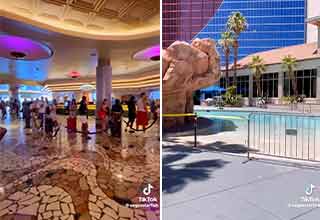
Unless you’re from Miami, the sentence “he made a party” probably makes no sense to you. That’s because it’s an example of a new dialect that’s developed in South Florida, according to Associate Professor of Linguistics Phillip M. Carter, who teaches at Florida International University.
Carter recently unveiled research he’s conducted indicating that a new dialect is emerging in Miami, as a result of ongoing contact between Spanish and English speakers, particularly when Spanish speakers translate directly from their native tongue to English.
Focusing on calques, which Carter explains are loan translations “where you don't borrow the word, but you borrow the concept and you translate it into the target language,” Carter found countless examples in the speech of Miami residents that don’t exist anywhere else in the U.S. One example is “get down from the car,” which in Spanish is bajar del carro; it sounds unusual in English, because native English speakers would typically say “get out of the car,” but when understood as a calque taken directly from Spanish, it makes sense.
As Carter explains, this method of translation makes sense for speakers who are new to a language: “They lean into that as a source to help them get through acquiring the target language, and they literally just translate expressions.” Another example of this type of translation found in Miami is “married with” instead of “married to,” based on casarse con in Spanish, which translated literally means “married with.” Carter also found “semantic calques,” translations of meaning, as well as “phonetic calques,” translations of certain sounds — “thanks God,” derived from gracias a dios, instead of “thank God,” with speakers taking the “s” from gracias and adding it to the end of “thank.”
The study found that far from being limited to immigrant communities, this way of speaking had spread out into the wider Miami community and become part of the vernacular of English speakers with no Spanish language knowledge or Latin heritage. Carter argues that this is what suggests it’s a new dialect, rather than a localized version of “Spanglish,” a Spanish-English pidgin where someone from a Spanish-speaking family peppers Spanish words into otherwise English sentences.
@eleanor.stern if u are from miami please offer your thoughts. if you are from louisiana did u know that “make the block” for circle the block is a local thing bc i didnt #linguistics #languages ♬ original sound - Eleanor Stern
Eleanor Stern, a TikToker, points out that a similar phenomenon took place in Louisiana as a result of French influence. Phrases like “making groceries” used by locals that would sound strange to outsiders came about as a result of direct translations from the French verb faire, which means “to make” or “to do” and can be used in a wider variety of situations than its English counterparts.
It’s only anecdotal, but many people in Stern’s comments pointed out that they’ve been using similar calques in their speech for a long time, questioning just how “new” this dialect is, and whether it really can be restricted to Miami or not. With the U.S. having the second-most Spanish speakers outside of Spain itself, hopefully more research can be done into the fascinating ways people have molded the English language in their image.
But for now, we’ll leave you with whatever is South Floridian for arrivederci.






1 Comments